情态动词经典练习题
情态动词经典例题

情态动词经典例题一、情态动词单项选择题1.We ________ see which way to go if the stars do not twinkle(闪耀)so.A.can not B.should not C.must not D.need not【答案】A【解析】【分析】【详解】句意:如果星星不这样闪烁,我们就不能看见往哪个方向走。
考查情态动词。
can not不能;should not不应该;must not不必、不允许;need not不需要。
根据“if the st ars do not twinkle(闪耀)so.”结合“We … see which way to go”,可知如果星星不这样闪烁,我们就不能看见往哪个方向走,因此用can not“不能”,故选A。
2.—Tony, could you please answer the door?—Sorry, Mum. I ________. I'm taking an English exam on the Internet.A.can't B.mustn't C.needn't【答案】A【解析】【详解】句意:——托尼,请你开门好吗?——对不起,妈妈。
我不能。
我正在网上参加英语考试。
考查情态动词。
can't 不能;mustn't 不许,表禁止;needn't不必;根据“could you please answer the door”请求对方做某事;可知答语是回应“能不能做”;故选A。
3.—Is that red schoolbag Mary’s?—It __________ be hers. She hates that color.A.may B.mustn’t C.can’t D.might【答案】C【解析】【详解】句意:——那个红色的书包是Mary的吗?——不可能是她的,她讨厌那个颜色。
情态动词专题(含答案)经典

情态动词专题(含答案)经典一、初中英语情态动词1.——Do you have any plans for this summer vacation? ——I'm not sure. I ___ take a trip to Taiwan.A. mustB. needC. mayD. should【答案】C【解析】【分析】句意:一今天暑假你有什么计划吗?一我还不确定。
我可能去台湾去旅行。
A.必须,一定;B.需要,必要;C.可能;D.应该。
根据句中I'm not sure可知,说话人还没有确定的计划,所以这只是一个可能,应选C。
2.—Where is Monica? I can't find her anywhere.—She be in the library. She loves reading books when she is free.A. mustB. needC. can't【答案】 A【解析】【分析】句意:——莫妮卡在哪?我到处都找不到她。
——她肯定在图书馆,她喜欢空闲时看书。
A肯定,肯定句中表示推测,B需要,C不可能,否定句中表示推测,根据 She loves reading books when she is free ,可知是肯定句表示推测,故选A。
【点评】考查情态动词,注意情态动词表推测的用法。
3.You be tired after walking for such a long time. Sit down and have a rest.A. canB. can'tC. mustn'tD. must【答案】 D【解析】【分析】句意:走了这么长时间你一定很累了。
坐下休息一下吧。
can能,能够,can't不能,对事物进行否定推测;mustn't一定不是,禁止,must一定,对事物进行肯定推测,根据after walking for such a long time,可以肯定你一定很累,所以是进行肯定推测,情态动词使用must,故选D。
情态动词经典例题

情态动词经典例题一、情态动词单项选择题1.—Is that Miss Liu over there?—No. It ________ be her. She has gone to the USA.A.mustn't B.can't C.won't D.needn't【答案】B【解析】【分析】【详解】句意:——是刘小姐在那边吗?——不是。
那不可能是她。
她去美国了。
考查情态动词。
mustn’t不准;can’t不可能;won’t将不;needn’t没必要。
根据“She has gone to the USA她去美国了”可知那不可能是刘小姐,应用“can’t”表示否定推测。
故选B。
2.The teacher you saw in our classroom just now ________ be Mr. Wang. He has gone to Chongqing to attend a meeting.A.must B.might C.can’t【答案】C【解析】【详解】句意:你刚才在我们教室看到的那个老师不可能是王老师。
他去重庆开会了。
考查情态动词。
must必须;might可能;can’t不可能;根据“He has gone to Chongqing to attend a meeting.”可知,刚看到的不可能是王老师,应用can’t“不可能”,故选C。
3.— Tim, ________ you play ice-hockey?— Yes, I can.A.can B.should C.must D.need【答案】A【解析】【分析】【详解】句意:——Tim,你会打冰球吗?——是的,我会。
考查情态动词。
can能够;should应该;must必须;need需要。
根据回答“Yes, I can.”可知问句是Can引导的一般疑问句,此处can表能力。
故选A。
4.Rock music ________ sound popular with the young, but it’s not popular with the aged people.A.may B.need C.should D.must【答案】A【解析】【详解】句意:摇滚乐可能听起来会受年轻人欢迎,但不会受老年人欢迎。
【英语】情态动词知识点(大全)经典

【英语】情态动词知识点(大全)经典一、初中英语情态动词1. Look! The traffic light has turned red. We _____ stop our car.A. canB. can'tC. mustD. mustn't【答案】 C【解析】【分析】句意:看交通灯成了红灯。
我们必须停车。
turned灯成了红灯;stop sth停止某物A. can能; B. can't不能; C. must必须; D.mustn't千万别,一定不要。
根据常识可知红灯停,这是必须的,故选C2.—Where is Monica? I can't find her anywhere.—She be in the library. She loves reading books when she is free.A. mustB. needC. can't【答案】 A【解析】【分析】句意:——莫妮卡在哪?我到处都找不到她。
——她肯定在图书馆,她喜欢空闲时看书。
A肯定,肯定句中表示推测,B需要,C不可能,否定句中表示推测,根据 She loves reading books when she is free ,可知是肯定句表示推测,故选A。
【点评】考查情态动词,注意情态动词表推测的用法。
3.A hard-working man ______ become a great scientist, but a great scientist _______ be a hard-working man.A. can't; canB. may not; mustC. can't; mustD. may not; can【答案】 B【解析】【分析】句意:一个勤奋的人可能不会成为一位伟大的科学家,但是一位伟大的科学家一定是一个勤奋的人。
can't不可能,不会;can可能,能,会;may not 可能不;must 必须,一定;结合句意,可知,第一个空为“可能不”,第二个空为“一定”,故答案为B。
最新情态动词知识点(大全)经典

最新情态动词知识点(大全)经典一、初中英语情态动词1.— I take the magazine out of the reading room?— I'm sorry you .A. Could; couldn'tB. Must; couldn'tC. Will; can'tD. May; can't【答案】 D【解析】【分析】句意:——我可以把杂志带出阅览室吗?——对不起,你不能。
could 能,可以;must必须;will将;may可以;can能,可以,can't不可以,不能。
此处表示请求许可,用could或者may,由could或者may构成的一般疑问句,肯定回答用yes,主语+can,否定回答用sorry,主语+can't,结合选项,故答案选D。
【点评】考查情态动词的辨析。
注意理解句意,理解选项,根据语境,选出正确的答案。
2.—Where is Monica? I can't find her anywhere.—She be in the library. She loves reading books when she is free.A. mustB. needC. can't【答案】 A【解析】【分析】句意:——莫妮卡在哪?我到处都找不到她。
——她肯定在图书馆,她喜欢空闲时看书。
A肯定,肯定句中表示推测,B需要,C不可能,否定句中表示推测,根据 She loves reading books when she is free ,可知是肯定句表示推测,故选A。
【点评】考查情态动词,注意情态动词表推测的用法。
3.You be tired after walking for such a long time. Sit down and have a rest.A. canB. can'tC. mustn'tD. must【答案】 D【解析】【分析】句意:走了这么长时间你一定很累了。
情态动词经典例题
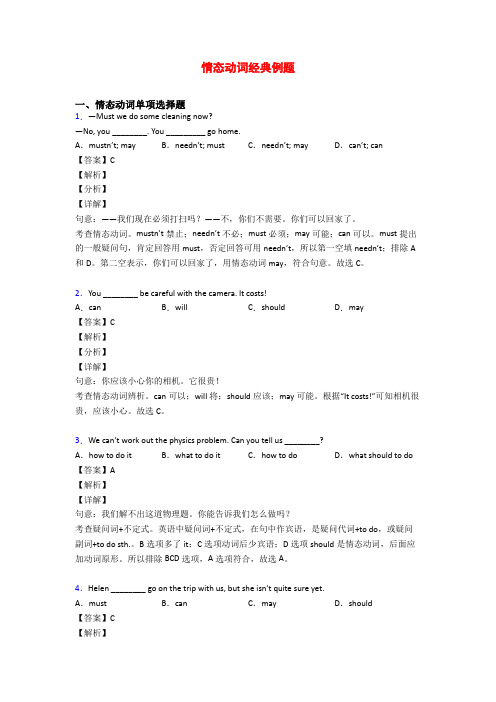
情态动词经典例题一、情态动词单项选择题1.—Must we do some cleaning now?—No, you ________. You _________ go home.A.mustn’t; may B.needn’t; must C.needn’t; may D.can’t; can【答案】C【解析】【分析】【详解】句意:——我们现在必须打扫吗?——不,你们不需要。
你们可以回家了。
考查情态动词。
mustn’t禁止;needn’t不必;must必须;may可能;can可以。
must提出的一般疑问句,肯定回答用must,否定回答可用needn’t,所以第一空填needn’t;排除A 和D。
第二空表示,你们可以回家了,用情态动词may,符合句意。
故选C。
2.You ________ be careful with the camera. It costs!A.can B.will C.should D.may【答案】C【解析】【分析】【详解】句意:你应该小心你的相机。
它很贵!考查情态动词辨析。
can可以;will将;should应该;may可能。
根据“It costs!”可知相机很贵,应该小心。
故选C。
3.We can’t work out the physics problem. Can you tell us ________?A.how to do it B.what to do it C.how to do D.what should to do 【答案】A【解析】【详解】句意:我们解不出这道物理题。
你能告诉我们怎么做吗?考查疑问词+不定式。
英语中疑问词+不定式,在句中作宾语,是疑问代词+to do,或疑问副词+to do sth.。
B选项多了it;C选项动词后少宾语;D选项should是情态动词,后面应加动词原形。
所以排除BCD选项,A选项符合,故选A。
4.Helen ________ go on the trip with us, but she isn’t quite sure yet.A.must B.can C.may D.should【答案】C【解析】【详解】句意:海伦可能和我们去旅行,但是她还不是很确定。
情态动词练习题及答案
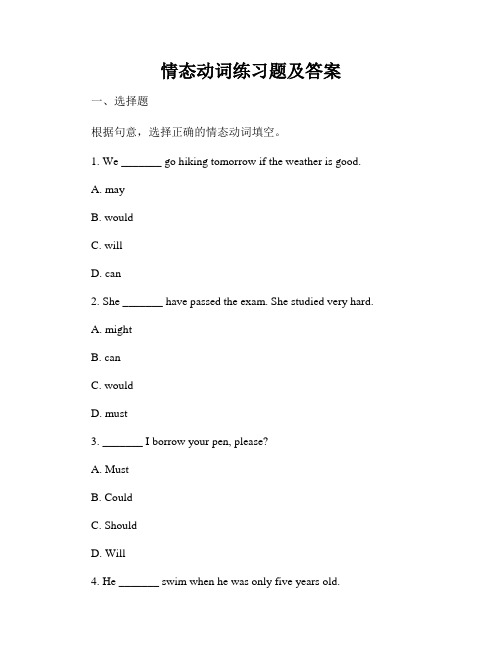
情态动词练习题及答案一、选择题根据句意,选择正确的情态动词填空。
1. We _______ go hiking tomorrow if the weather is good.A. mayB. wouldC. willD. can2. She _______ have passed the exam. She studied very hard.A. mightB. canC. wouldD. must3. _______ I borrow your pen, please?A. MustB. CouldC. ShouldD. Will4. He _______ swim when he was only five years old.A. couldB. mayC. mightD. would5. You _______ eat too much junk food. It's bad for your health.A. mightB. shouldC. canD. would二、填空题根据句意,用适当的情态动词填空。
1. You _______ call the doctor. You don't look well.2. I _______ have forgotten to lock the door. I'll go back and check.3. _______ I go to the party with you? I don't have any other plans.4. They _______ be late for the meeting. It starts in 10 minutes.5. He _______ play the guitar very well when he was young.三、改错题找出每句中的错误并改正。
情态动词练习题(含答案)1
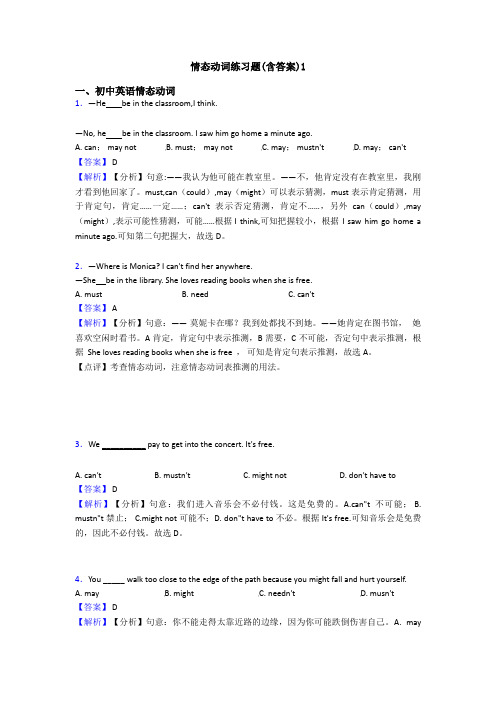
情态动词练习题(含答案)1一、初中英语情态动词1.—He be in the classroom,I think.—No, he be in the classroom. I saw him go home a minute ago.A. can; may notB. must; may notC. may; mustn'tD. may; can't【答案】 D【解析】【分析】句意:——我认为他可能在教室里。
——不,他肯定没有在教室里,我刚才看到他回家了。
must,can(could),may(might)可以表示猜测,must表示肯定猜测,用于肯定句,肯定……一定……;can't表示否定猜测,肯定不……,另外can(could),may (might),表示可能性猜测,可能……根据I think,可知把握较小,根据I saw him go home a minute ago.可知第二句把握大,故选D。
2.—Where is Monica? I can't find her anywhere.—She be in the library. She loves reading books when she is free.A. mustB. needC. can't【答案】 A【解析】【分析】句意:——莫妮卡在哪?我到处都找不到她。
——她肯定在图书馆,她喜欢空闲时看书。
A肯定,肯定句中表示推测,B需要,C不可能,否定句中表示推测,根据 She loves reading books when she is free ,可知是肯定句表示推测,故选A。
【点评】考查情态动词,注意情态动词表推测的用法。
3.We __________ pay to get into the concert. It's free.A. can'tB. mustn'tC. might notD. don't have to【答案】 D【解析】【分析】句意:我们进入音乐会不必付钱。
小学修改情态动词分类练习(含答案)

小学修改情态动词分类练习(含答案)一、请根据句意,选择合适的情态动词填空。
1. 你______帮我一下吗?我不能搬这个箱子。
(能)2. 明天是周末,你______去公园玩吗?(会)3. 我们______一起去购物吧!(应该)4. 她想去看电影,但是她______去,因为她有很多事情要做。
(不能)5. 你______告诉我这个秘密吗?我能保守秘密的。
(可以)二、请根据句意,修改下列句子中的情态动词。
1. 我能帮你拿行李。
(修改为“我可以帮你拿行李。
”)2. 你应该吃早饭。
(修改为“你应该要吃早饭。
”)3. 他能参加我们的聚会。
(修改为“他可以参加我们的聚会。
”)4. 你得好好努力研究。
(修改为“你必须好好努力研究。
”)5. 我可以陪你玩游戏。
(修改为“我能陪你玩游戏。
”)三、请给下列句子中的情态动词分类。
1. 我可以去图书馆借书。
(自由意愿)2. 你应该好好研究才能取得好成绩。
(建议)3. 他能在音乐比赛中表现得很出色。
(能力)4. 这个问题太难了,我不能回答。
(限制)5. 你会游泳吗?(能力)答案:一、1. 能;2. 会;3. 应该;4. 不能;5. 可以二、1. 我可以帮你拿行李。
2. 你应该要吃早饭。
3. 他可以参加我们的聚会。
4. 你必须好好努力研究。
5. 我能陪你玩游戏。
三、自由意愿:1. 我可以去图书馆借书。
建议:2. 你应该好好研究才能取得好成绩。
能力:3. 他能在音乐比赛中表现得很出色;5. 你会游泳吗?限制:4. 这个问题太难了,我不能回答。
初一英语常用语法知识——情态动词经典练习题(含答案)

一、选择题1.Grandpa, you'd better not smoke any more. Follow the doctor's advice, ___________ you will be well very soon.A.and B.or C.so D.but A解析:A【解析】【详解】句意:爷爷,你最好不要再抽烟了。
遵循医生的建议,你将会很快康复。
A. and和,又,表并列和顺承关系;B. or否则,表选择关系;C. so所以,表结果;D. but 但是,表转折关系。
根据遵循医生的建议,你将会很快康复,可知,两句之间呈递进关系,故选A。
2.______ talk in the library.A.Don’t B.Not C.Not to A解析:A【解析】【详解】句意:在图书馆不要说话。
此处是祈使句的否定形式,因此在动词原形前加don’t,故为Don’t+动词原形。
故选A。
3.Peter, here, or I’ll ask you to get out of the library.A.not shout B.don’t shout C.not to shout D.no shout B解析:B【解析】【详解】句意:Peter,不要在这里大喊,否则我会让你从图书馆出去。
not shout不喊;don’t shout 不要大喊;not to shout动词不定式的否定形式;no shout形式错误。
这是一个祈使句,否定形式应在动词原形前加don’t,故选B。
4.Don’t________ in the classroom. It’s important ________ quiet when you study. A.talk, keep B.to talk, keep C.talk, to keep D.to talk, to keep C 解析:C【解析】【详解】句意:不要在教室里交谈。
七年级下英语常用语法知识——情态动词经典复习题(含答案)

一、选择题1.Sam, ________ your teeth before going to bed.A.is brushing B.brushes C.brush D.has brushed C解析:C【解析】【详解】句意:Sam,睡觉前刷牙。
考查祈使句。
is brushing现在进行时;brushes第三人称单数;brush刷,动词原形;has brushed现在完成时。
根据Sam, ___ your teeth before going to bed.可知本句为祈使句,所以此处应用动词原形,故答案选C。
2.late for class again, Ann.A.Don’t be B.Can’t C.Don’t D.Be A解析:A【解析】【分析】【详解】句意:别再迟到了,安。
考查祈使句辨析。
be late for迟到;祈使句需用原形动词,否定式在句首加don’t;根据句意结构,可知选A。
3.—_____________ dressed now! We have to go in ten minutes.—OK, Mom.A.Getting B.Get C.To get D.Gets B解析:B【解析】【详解】句意:——现在就穿上衣服!十分钟之后我们必须走。
——好的,妈妈。
考查祈使句。
空格所在句为祈使句,祈使句以动词原形开头。
根据句意结构,可知选B。
4.Peter, here, or I’ll ask you to get out of the library.A.not shout B.don’t shout C.not to shout D.no shout B解析:B【解析】【详解】句意:Peter,不要在这里大喊,否则我会让你从图书馆出去。
not shout不喊;don’t shout 不要大喊;not to shout动词不定式的否定形式;no shout形式错误。
这是一个祈使句,否定形式应在动词原形前加don’t,故选B。
情态动词知识点梳理及经典练习(超详细)(word)

情态动词知识点梳理及经典练习(超详细)(word)一、初中英语情态动词1.—Could you go to the bookshop with me? I want to buy The Grass House by Cao Wenxuan.—Sorry, I . I've promised Mum to go home right after school.A. can'tB. couldn'tC. needn'tD. mustn't【答案】 A【解析】【分析】句意:—你能和我去书店吗?我想买一本曹文轩写的《草房子》。
—对不起,我不能去。
我答应我妈妈放学后直接回家了。
在问句中的could表示委婉语气,不是过去式,所以回答时用can't,不能;needn't 不需要;mustn't一定不要,千万别。
结合句意,故选A。
【点评】考查情态动词,回答could提问的时候应使用can。
2.—I've bought all the food for the party tonight.—Thank you. Then I _______ go to the supermarket.A. can'tB. mustn'tC. shouldn'tD. needn't【答案】 D【解析】【分析】句意:-今天晚上我买好了所有晚会的食物。
-谢谢你。
那么我就不必去超市了。
A. can't不能;B. mustn't不准,不允许,禁止;C. shouldn't不应该;D. needn't 不必。
你买好了,我就不必去买了。
故选D。
【点评】考查情态动词,表示不必要应使用need的形式,要牢记不同的情态动词的意思。
3.— __________I wear a tie to Janet's birthday party?— No,you needn't. But do remember to bring her a present.A. MustB. ShouldC. NeedD. Can【答案】 A【解析】【分析】句意:——我必须戴领带去参加Jane的生日聚会吗?——不,你不必,但是记住给她带个礼物。
情态动词经典例题

情态动词经典例题一、情态动词单项选择题1.—Must I return this book before Friday, Sir?—No, you ________, dear. You can keep it for two weeks.A.can’t B.shouldn’t C.mustn’t D.needn’t【答案】D【解析】【详解】句意:——先生,我必须在星期五之前归还这本书吗?——不,你不必,亲爱的。
你可以借两周。
考查情态动词辨析。
can’t不能;shouldn’t不应该;mustn’t禁止;needn’t不必。
must引导的一般疑问句,否定句用needn’t回答,故选D。
2.Don’t go out if you have the flu. You ________ stay at home.A.should B.may C.will【答案】A【解析】【详解】句意:如果你得了流感就不要出去。
你应该待在家里。
考查情态动词。
should应该;may可能;will将要。
根据“Don’t go out if you have the flu.”可知,此处表示得了流感应该待在家里,表示建议,用情态动词should。
故选A。
3.—Mom, must I prepare for the New Year’s party right now?—No, you ________. But you have to get everything ready before all the guests arrive. A.needn’t B.can’t C.mustn’t【答案】A【解析】【详解】句意:——妈妈,我必须现在就为新年晚会做准备吗?——不,你不必。
但是你必须在所有客人到来之前把一切都准备好。
考查情态动词辨析。
needn’t不必;can’t不能够;mustn’t禁止。
must引导的一般疑问句,否定回答用needn’t或don’t have to,故选A。
情态动词知识点(大全)经典
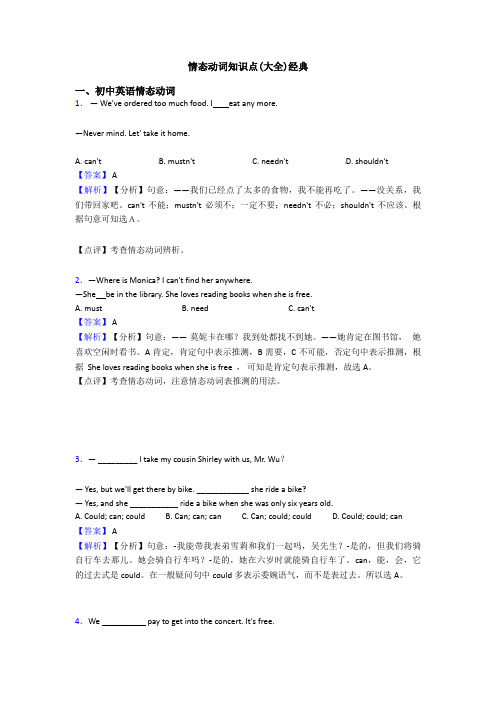
情态动词知识点(大全)经典一、初中英语情态动词1.— We've ordered too much food. I eat any more.—Never mind. Let' take it home.A. can'tB. mustn'tC. needn'tD. shouldn't【答案】 A【解析】【分析】句意:——我们已经点了太多的食物,我不能再吃了。
——没关系,我们带回家吧。
can't不能;mustn't必须不;一定不要;needn't不必;shouldn't不应该。
根据句意可知选A。
【点评】考查情态动词辨析。
2.—Where is Monica? I can't find her anywhere.—She be in the library. She loves reading books when she is free.A. mustB. needC. can't【答案】 A【解析】【分析】句意:——莫妮卡在哪?我到处都找不到她。
——她肯定在图书馆,她喜欢空闲时看书。
A肯定,肯定句中表示推测,B需要,C不可能,否定句中表示推测,根据 She loves reading books when she is free ,可知是肯定句表示推测,故选A。
【点评】考查情态动词,注意情态动词表推测的用法。
3.— _________ I take my cousin Shirley with us, Mr. Wu?— Yes, but we'll get there by bike. ____________ she ride a bike?— Yes, and she ___________ ride a bike when she was only six years old.A. Could; can; couldB. Can; can; canC. Can; could; couldD. Could; could; can【答案】 A【解析】【分析】句意:-我能带我表弟雪莉和我们一起吗,吴先生?-是的,但我们将骑自行车去那儿。
初一下英语常用语法知识——情态动词经典练习(专题培优)

一、选择题1.Hurry up, _________ you will be late for class.A.and B.or C.but D.so B解析:B【解析】【分析】【详解】句意:快点,否定你将会上学迟到。
考查祈使句。
“祈使句,and +一般将来时的陈述句”:在这里祈使句相当于if 引导的条件状语从句(但此时去掉and),and后简单句一般是表示好的结果。
“祈使句,or+一般将来时的陈述句”:在这里祈使句相当于if…not或unless 引导的条件状语从句(但此时去掉or),or后简单句一般是表不理想的结果。
例如,(1)Give me one more hour, and I’ll get the work finished.(祈使句)=If you give me one more hour, I’ll get the work finished.(if条件句)(2)Listen to the teacher carefully in class, or you can’t catch what he is saying.=If don’t listen to the teacher carefully in class, you can’t catch what he is saying.结合句意可知填or;选B2.Walk ______ the white building and ______ the street. You won’t miss it.A.pass; cross B.past; cross C.pass; across D.past; across B解析:B【解析】【分析】【详解】句意:走过白楼,过马路。
你不会错过的。
考查介词和词义辨析。
1.pass:经过,动词,past:经过介词,walk past sp.=pass sp.:经过某个地方;2. cross和across都有“穿过,越过”,cross动词,across是介词。
情态动词经典例题

情态动词经典例题一、情态动词单项选择题1.—What will the weather be like tomorrow?—It ________ be rainy, cloudy or sunny. I am not sure.A.must B.may C.can’t D.should【答案】B【解析】【分析】【详解】句意:——明天天气如何?——可能是雨天,多云或晴天。
我不确定。
考查情态动词用法。
must必须,一定,表肯定推测;may可能,表肯定推测;can’t不可能,一定不,表否定推测;should应该,不表推测。
此处是情态动词表推测,排除选项D;根据空后“ be rainy, cloudy or sunny. I am not sure.”可知,此处是肯定推测,并且表“可能是雨天,多云或晴天”,排除选项C和A。
故选B。
2.—Mom, do you know where my keys are? I can’t find them.—I’m not sure. They ________ be in your white bag.A.shall B.may C.will D.must【答案】B【解析】【详解】句意:——妈妈,你知道我的钥匙在哪里吗?我找不到他们。
——我不知道。
它们可能在你的白色包里。
考查情态动词辨析。
shall将;may可能;will愿意;must必须。
根据“I’m not sure.”可知,妈妈也不确定,因此是“可能”在白包里。
故选B。
3.— I saw Tom in the playground just now.— It ________ him. He has gone to Beijing on business.A.may not be B.can’t be C.must be D.shouldn’t be【答案】B【解析】【详解】句意:——我刚才看见汤姆在操场上。
情态动词考点解析(Word版附答案)经典
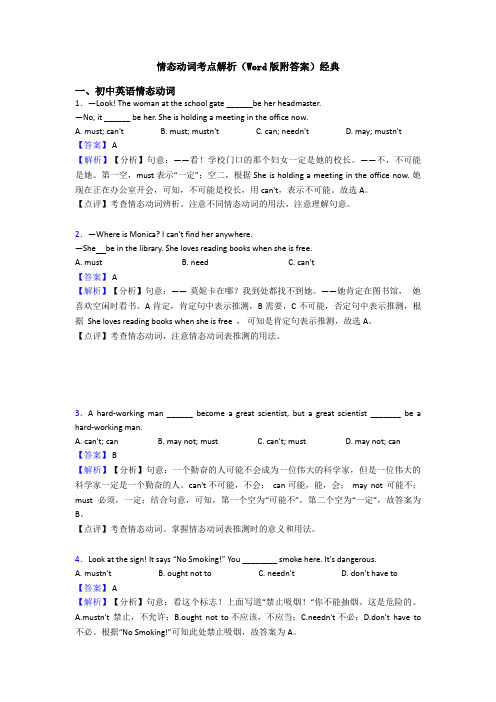
情态动词考点解析(Word版附答案)经典一、初中英语情态动词1.—Look! The woman at the school gate ______be her headmaster.—No, it ______ be her. She is holding a meeting in the office now.A. must; can'tB. must; mustn'tC. can; needn'tD. may; mustn't【答案】 A【解析】【分析】句意:——看!学校门口的那个妇女一定是她的校长。
——不,不可能是她。
第一空,must表示“一定”;空二,根据She is holding a meeting in the office now. 她现在正在办公室开会,可知,不可能是校长,用can't,表示不可能。
故选A。
【点评】考查情态动词辨析。
注意不同情态动词的用法,注意理解句意。
2.—Where is Monica? I can't find her anywhere.—She be in the library. She loves reading books when she is free.A. mustB. needC. can't【答案】 A【解析】【分析】句意:——莫妮卡在哪?我到处都找不到她。
——她肯定在图书馆,她喜欢空闲时看书。
A肯定,肯定句中表示推测,B需要,C不可能,否定句中表示推测,根据 She loves reading books when she is free ,可知是肯定句表示推测,故选A。
【点评】考查情态动词,注意情态动词表推测的用法。
3.A hard-working man ______ become a great scientist, but a great scientist _______ be a hard-working man.A. can't; canB. may not; mustC. can't; mustD. may not; can【答案】 B【解析】【分析】句意:一个勤奋的人可能不会成为一位伟大的科学家,但是一位伟大的科学家一定是一个勤奋的人。
情态动词经典例题

情态动词经典例题一、初中英语情态动词1. Look! The traffic light has turned red. We _____ stop our car.A. canB. can'tC. mustD. mustn't【答案】 C【解析】【分析】句意:看交通灯成了红灯。
我们必须停车。
turned灯成了红灯;stop sth停止某物A. can能; B. can't不能; C. must必须; D.mustn't千万别,一定不要。
根据常识可知红灯停,这是必须的,故选C2.—Where is Monica? I can't find her anywhere.—She be in the library. She loves reading books when she is free.A. mustB. needC. can't【答案】 A【解析】【分析】句意:——莫妮卡在哪?我到处都找不到她。
——她肯定在图书馆,她喜欢空闲时看书。
A肯定,肯定句中表示推测,B需要,C不可能,否定句中表示推测,根据 She loves reading books when she is free ,可知是肯定句表示推测,故选A。
【点评】考查情态动词,注意情态动词表推测的用法。
3.Look at the sign! It says “No Smoking!” You ________ smoke here. It's dangerous.A. mustn'tB. ought not toC. needn'tD. don't have to【答案】 A【解析】【分析】句意:看这个标志!上面写道“禁止吸烟!“你不能抽烟。
这是危险的。
A.mustn't 禁止,不允许;B.ought not to不应该,不应当;C.needn't不必;D.don't have to 不必。
南京市中考英语常用语法知识——情态动词经典练习
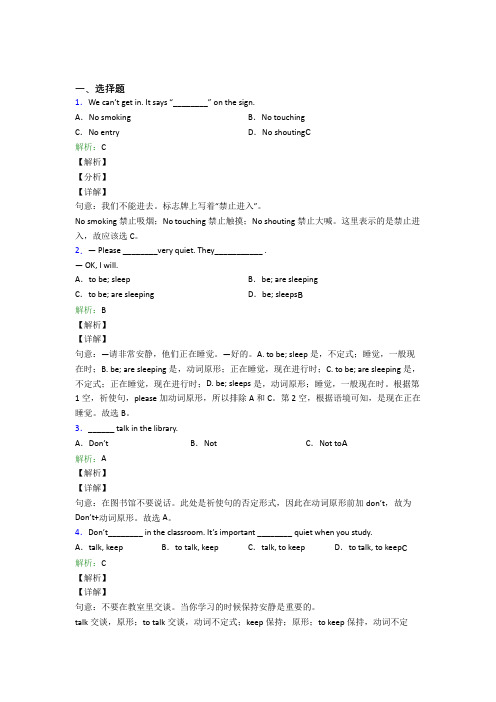
一、选择题1.We can’t get in. It says “________” on the sign.A.No smoking B.No touchingC.No entry D.No shouting C解析:C【解析】【分析】【详解】句意:我们不能进去。
标志牌上写着“禁止进入”。
No smoking 禁止吸烟;No touching禁止触摸;No shouting禁止大喊。
这里表示的是禁止进入,故应该选C。
2.— Please ________very quiet. They___________ .— OK, I will.A.to be; sleep B.be; are sleepingC.to be; are sleeping D.be; sleeps B解析:B【解析】【详解】句意:—请非常安静,他们正在睡觉。
—好的。
A. to be; sleep是,不定式;睡觉,一般现在时;B. be; are sleeping是,动词原形;正在睡觉,现在进行时;C. to be; are sleeping是,不定式;正在睡觉,现在进行时;D. be; sleeps是,动词原形;睡觉,一般现在时。
根据第1空,祈使句,please加动词原形,所以排除A和C。
第2空,根据语境可知,是现在正在睡觉。
故选B。
3.______ talk in the library.A.Don’t B.Not C.Not to A解析:A【解析】【详解】句意:在图书馆不要说话。
此处是祈使句的否定形式,因此在动词原形前加don’t,故为Don’t+动词原形。
故选A。
4.Don’t________ in the classroom. It’s important ________ quiet when you study. A.talk, keep B.to talk, keep C.talk, to keep D.to talk, to keep C解析:C【解析】【详解】句意:不要在教室里交谈。
- 1、下载文档前请自行甄别文档内容的完整性,平台不提供额外的编辑、内容补充、找答案等附加服务。
- 2、"仅部分预览"的文档,不可在线预览部分如存在完整性等问题,可反馈申请退款(可完整预览的文档不适用该条件!)。
- 3、如文档侵犯您的权益,请联系客服反馈,我们会尽快为您处理(人工客服工作时间:9:00-18:30)。
情态动词经典练习题一、单项选择情态动词1.We ________ take clean drinking water for granted. One day we may run out of it. A.needn't B.can'tC.won't D.shouldn't【答案】D【解析】【详解】考查情态动词。
句意:我们不应该把拥有洁净的饮用水看作是理所当然的。
也许有一天,我们会用完它。
shouldn't“不应该”,符合句意。
needn't不必;can't不可能;won't将不。
故选D。
2.-- Turn off the TV, Jack. _______ your homework now?-- Mum, just ten more minutes, please.A.Will you be doing B.Should you be doingC.Shouldn't you be doing D.Couldn’t you be doing【答案】C【解析】【详解】考查含情态动词的进行时态。
句意:——把电视关掉,杰克。
你现在不应该做作业吗?——妈妈,请再给我十分钟。
此处表示目前应该在做某事,should“应该”,这里用含情态动词的进行时态,故选C。
3.I often felt troubled in my teens and my grandma ________ comfort me, saying “Life is like that, dear”.A.would B.might C.should D.must【答案】A【解析】【详解】考查情态动词。
句意:在我十几岁的时候,我经常感到烦恼,我的奶奶会安慰我说,“生活就是这样,亲爱的”。
此处是would+动词原形,表示“过去总是做某事”。
故选A。
4.It wasn’t right to me that such near neighbors not know one another.A.could B.wouldC.should D.might【答案】C【解析】【详解】考查情态动词。
句意:对我来说,很不正常,如此近的邻居居然不认识。
A. could可能,能够;B. would将;C. should竟然;D. might可能,也许。
should 作为情态动词,可以用来表示意外、惊喜或者在说话人看来是不可思议的,常常译为"竟会"、"居然",住的这么近的邻居居然不认识。
表示意外,所以答案选C。
【点睛】should的用法1、should 作为情态动词,通常用来表示现在或将来的责任或义务,译作“应该”、“应当”,这时它可以和 ought to, be supposed to 互换使用.例如:You should (= ought to ) tell your mother about it at once.2、should 作为情态动词,可以用在条件状语从句中,表示语气较强的假设,译作“万一”、“竟然”,这时也可将 should 置于从句之首,即将 should 放在主语前面,而省略从属连词 if。
例如:If you should fail to come, ask Mrs Chen to work in your place. (= Should you fail to come, ask Mrs Chen to work in your place. )3、should 作为情态动词,可以表示谦逊、客气、委婉之意,译为“可……”、“倒……”。
例如:I should say that it would be better to try it again.4、should 作为情态动词,可以用来表示意外、惊喜或者在说话人看来是不可思议的.尤其在以 why, who, how 等开头的修辞疑问句或某些感叹句中常常译为“竟会”、“居然”。
例如:How should I know it ? 我怎么会知道这件事?5、should 作为情态动词,可以用来表示有较大可能实现的猜测、推论,通常译为“可能”、“总该……吧”,相当于 be expected to 。
例如:They should be home by now, I think. 我想现在他们总该到家了吧。
6、should 作为情态动词,用在由 so that, for fear that, lest 引导的目的状语从句和 in case (that)引导的条件状语从句中,有“能够”、“可能”、“会”之意。
例如:They got up early so that they should (= could/ might) catch the first bus in time.7、should 作为情态动词,可以用于下列虚拟语气句中:(1)用在表示与将来事实相反的条件状语从句中,构成“ If …… should (do sth)……, …… would/ could/ might (do sth.)…… ”句式。
(2) 用在 suggest (propose), arrange, plan, decide, advise, order, demand, request, desire, insist 等表示“建议”、“要求”、“命令”、“决定”、“安排”、“计划”、“主张”的动词后面接的宾语从句中。
这里的 should 也可以省略。
本句中should 作为情态动词,可以用来表示意外、惊喜或者在说话人看来是不可思议的,常常译为"竟会"、"居然",住的这么近的邻居居然不认识。
表示意外,所以答案选C。
5.—What happened to the young trees we planted last week?—The trees ________ well, but I didn’t water them.A.might grow B.needn’t have grownC.would have grown D.would grow【答案】C【解析】考查虚拟语气。
——我们上周种的小树怎么了?——这些小树本来会长得很好,但是我们没有给它们浇水。
根据语境可知,此处是对过去的事实进行假设,故本题选C。
6.It_____ have been Tom that parked the car here, as he is the only one with a car.A.may B.can C.must D.should【答案】C【解析】【详解】考查情态动词表猜测的用法。
句意:一定是汤姆把车停在这儿的,因为他是唯一有车的人。
A. may可能;B. can可能;C. must一定;D. should应该。
由as he is the only one with a car.可知一定是他把车停在这里的,非常有把握的肯定推测,故选C。
7.It has been announced that all the students ________ put on masks before going to school in case they are infected with SARS virus.A.shall B.will C.need D.may【答案】A【解析】【详解】【详解】考查情态动词。
句意:所有学生们应在去学校之前带上口罩以防感染非典病毒,这已经被宣布。
shall用于第二、第三人称,表示说话人给对方命令、警告、允诺或威胁,故选A 项。
8.The weather turned out to be fine. I _____________ the trouble to carry the umbrella with me.A.should have taken B.must have takenC.couldn't have taken D.needn't have taken【答案】D【解析】【详解】考查情态动词 + have done。
句意:天气转晴了。
我本不必费心把伞带在身边。
A. should have taken本应该做某事,而实际上没做; B. must have taken对过去发生的事情的肯定猜测;C. couldn't have taken不可能;D. needn't have taken本来不需要,故选D。
9.—I saw your uncle take a t axi to the airport. Why didn’t you drive him there?—I __________. But my car ___________ .A.would; was fixed B.would have; was fixedC.would have; was being fixed D.did; was being fixed【答案】C【解析】【详解】考查虚拟语气和动词时态。
句意:---我看见你叔叔坐出租车去机场了。
你为什么不开车送他去那里呢?---我本来想送他了。
但是我的汽车当时正在修理。
根据语境可知说话人表示本来想做但是没有做的事情,应该用would have done;而修理汽车是指当他叔叔去机场的时候,表示过去正在进行的动作,故答案选C。
10.—______ you sing and dance at this late hour of the night?—Sorry, I will stop right now.A.May B.ShallC.Will D.Must【答案】D【解析】试题分析:考查情态动词的用法。
May可以,可能 Shall: 用于第一三人称的疑问句,表示说话人征求对方的意见或向对方请示。
‚用于二三人称的陈述句表示说话人给对方的命令、警告、允诺、威胁或决心等。
ƒ用于法律、法规条文、合同等,按规定应该履行的义务等。
Will 表示请求或建议;表示意愿或表示现在的习惯D. Must表示“必须”“一定”“偏要”之意。
此处must表示“偏要,偏偏”。
句意:——你偏要在深夜又唱又跳吗?——很抱歉,我会马上停止。
考点:考查情态动词的用法。
11.—Daddy, would you please buy me an iPhoneX?—If you can pass this midterm examination, you __________ have one as a reward.A.must B.needC.would D.shall【答案】D【解析】【详解】考查情态动词。
